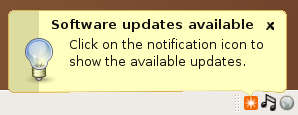Five Tired Old Myths About GNU/Linux
Where I'm Coming FromAdrian Kingsley-Hughes wrote a piece over at ZDNet addressing what he views as "five crucial things the Linux community doesn't understand about the average computer user". I'll examine each of his points, and hopefully help him see things a little differently. Frankly, the biggest reason people aren't switching to GNU/Linux has a lot more to do with the pervasiveness of the Microsoft brand than any of the issues Adrian raised. On the whole, users aren't all that dissatisfied with WindowsAdrian suggests that "There are millions of users out there who just get on and use their PCs without any real difficulty." That may or may not be true. He doesn't offer any evidence to support his claim, so it's really difficult to address. However, I have encountered numerous people in my own daily life who have experienced tremendous difficulty with the Windows operating system. What's more, I personally know several hundred people who have encountered numerous other people facing difficulties with Windows. There are two more likely reasons why people haven't switched to GNU/Linux. One is brand recognition. People buy Macs, not because they don't want GNU/Linux, but because a Mac is the only alternative many know about. I have met people who think - literally - that the only name in computer software is Microsoft. In other words, many people don't know about GNU/Linux to consider it as an option. Even so, Macs at least have FreeBSD at their core. The other reason is that people have been conditioned to exect less from a software vendor. The lack of interoperability has led to a monopoly, which in turn has led to decreased competition and, subsequently, quality. Perhaps the Microsoft security model has improved with Vista, but an awful lot of the current model seems to dwell on DRM as much as protecting users. Too many distrosWhat are you smoking over there? Sure, some people fear choice. They fret and break into cold sweats over choices. But that doesn't apply to everyone. And people need to remember that the lack of choice has hurt them badly over the last 20 years. Honestly, though, I haven't heard all that many people complaining about not being able to choose a GNU/Linux distro. I can't recall the last time a newbie posted a note sayin, "I can't figure out which distro to choose. I'm off to reinstall Windows". People want certainty that hardware and software will workThis one blows my mind. I wish like hell someone - anyone - would name the hardware vendors as the culprits here. I would fire off an e-mail to Kodak and Canon, but Dell ignored me until recently. Chances are, so will these mega-corporations who pay scant attention to journalists, let alone customers. Hardware manufacturers blame the lack of interest from consumers. Meanwhile, Windows users don't care if something works with GNU/Linux until they try to switch. But because they rarely bother to ask, the vendor sees no demand. Of course, maybe they figure the companies will ignore them, too. And I won't mention all those printers people spend up to a week trying to get working with Windows, despite being advertised as "plug-n-play". I can tell you that iAudio advertises all their portable audio players as working with GNU/Linux. I saw some USB keys as well - maybe the same ones you're thinking of. So that's at least two of the 5. What's more, my digital cameras from Canon and Kodak - along with most other devices I own - work out of the box with GNU/Linux, even though there is no advertisement to that effect. There are over 100 vendors in the LXer Pre-Installed Linux Vendor database that will sell you a computer with GNU/Linux pre-installed. Most, if not all, of them ensure the box works before they ship it. While it might be daunting for some to learn new applications, many of the GNU/Linux apps mimic the Windows apps closely enough that most people can figure out the basics fairly easily. And yes, I know some people have real difficulty adjusting to new applications. Some people also make it a bigger deal than it needs to be. Migrating some application data would be a bigger challenge, depending on the application. As far as most people are concerned, the command line has gone the way of the dinosaurO.k., now that I have gotten up from rolling in the floor with laughter... Is your name Rip Van Winkle? The truth is, there are some people who prefer the command-line, but hardly anyone is actually trying to migrate people from the Windows GUI to Bash. Every distro aimed at desktop users includes a GUI by default. You would have to be absolutely shnockered to suggest that anyone is seriously trying to promote the CLI as the default desktop environment. Well, o.k., maybe the Bash folks have setup spreadbash.org to do just that. But they're a minority. Linux is still too geekyFrom Adrian's own post: "But there are dark corners that absolutely reek of Linux geekdom cliquiness that average users aren't going to feel at home in (I don't feel at home there). Ubuntu updates are one such area where you need a high level of know-how to understand what's going on.What the Ubuntu dev team need to do is find, I don't know, 100 people who aren't Linux geeks and stick them in front of the OS."  Are we talking about the same thing? After this, you get a list and most people simply confirm the update. What part of this is so challenging to you? Please excuse me while I go guffaw some more. Had you argued that people sometimes have to resort to the command-line to fix hardware issues, I would have let you slide. But even that is better than searching through the Windows registry. Had you mentioned that Upgrading to the next version of Ubuntu might be tricky in some cases, I might have seen your point. But Ubuntu Update? Get real! Seriously, if you're going to write lame arguments about the underwhelming uptake of GNU/Linux on the desktop, the least you could do is link to some lame sources - Microsoft's "Get the Facts" site comes to mind - to back up your claims. That way, you don't come off like you went to sleep in 1999 and just woke up 10 minutes ago. Sure, GNU/Linux has its issues. Half of them have to do with businesses being unwilling to develop libre codecs, drivers and software. Another sizable portion has to do with "brand recognition". Frankly, that one is as big as any of the others. |
|
| Subject | Topic Starter | Replies | Views | Last Post |
|---|---|---|---|---|
| Too geeky, indeed | claus | 6 | 3,050 | May 27, 2007 9:03 AM |
| the command line | Lindsay | 2 | 2,591 | May 26, 2007 7:02 AM |
| Here's my winders gripe for the day.. | techiem2 | 9 | 3,522 | May 25, 2007 2:09 PM |
| Myth about GNU/Linux | janvl | 11 | 3,682 | May 25, 2007 9:23 AM |
| Too many distros? | TimSmithCA | 2 | 2,688 | May 25, 2007 8:25 AM |
| Great analogy | kozmcrae | 13 | 3,429 | May 24, 2007 7:30 PM |
| Not unhappy with Windows, eh? | dinotrac | 5 | 3,189 | May 24, 2007 5:44 PM |
You cannot post until you login.

